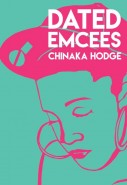
Book Review: Dated Emcees by Chinaka Hodge

Dated Emcees
Poems by Chinaka Hodge
City Lights/Sister Spit, May 2016
ISBN-13: 978-0872867024
$13.95: 64 pp.
Reviewed by Danny Caine
At first glimpse, it seems as if Chinaka Hodge’s short, brazen poetry collection Dated Emcees will revolve around the conceit of its title’s puns—a book concerning emcees who are both dated, as in old, and dated, as in romantically linked. Indeed, many of the emcees mentioned in this book are both romantically entangled with the speaker, and also decidedly old-school—Jay Z and Mystikal, for instance, but also Tupac and Biggie, who both receive formally inventive eulogies early on.
But the most energetic use of “dated” as in “old” comes when Hodge’s speaker lets loose on poorly aging minor, unnamed emcees—“old uncle rap” as the collection’s title poem, its first, has it. Hodges pulls no punches making a group of aging rappers look ridiculous. The poem starts, “on a fall evening in the early aughts old uncle rap / pulls up his gut, inspects the waistband of his track / pants, catches his reflection in a dull passing train.” This is not braggadocio, it’s aging insecurity; the poem’s party setting features “an impromptu cipher of washed up / rappers, finger-dead can holders, uprocking on / inflamed knees, asking what to do with the next decade.” Soon, and inevitably, one of the aging rappers turns his eyes to the speaker to “appraise me as sex-able if perhaps groupie.” We’ve landed on a thread running throughout the collection: the haunting specter of being called groupie, the struggle and difficulty “on being the other woman,” as one poem’s title states. As the title poem concludes, one of the aging rappers approaches the speaker and hands her his business card, which says “positive k: rapper.” Coming on to the speaker, “he like why not.” She responds with the title of his classic track, here re-casted to deflate the aging rapper’s ego and the thought that he can somehow woo the eighteen-year-old speaker at this party: “i’m like / i got a man.”
While the collection gets a lot of mileage out of the brash voice of its first poem, it soon expands its breadth to include other notes as well. The other sense of “dated,” the romantic one, animates the lovely poem “first date with the engaged rapper,” which opens with a stark and simple color pallet, as
the best handholding I ever did was in utah
me. an african. a blizzard.
the contrast.
the patterns.
snow flurries. his sable cheeks.
then a black-and-white talkie.
The snow, the innocence of simple hand-holding, and the simple color pallet, plus the old-timey use of “talkie” instead of “film” or “movie,” lend the poem a feeling of sweetness that culminates in its final lines, “who are we to know such gleeful, tiny betrayal / what right do we have to touch, rich and outlawed, / who dares find blackness in the snow and call it beautiful.”
The black and white color scheme in “first date with the engaged rapper” echoes with the long poem “light privilege or Lili speaks,” which claims
to be born this light
is to direct traffic from the center
of an isocoles triangle
etched over the atlantic.
A refrain in the poem echoes the parroting repetitive ignorant stranger: “oh my god what are you mixed with.” In its back half, Dated Emcees moves beyond the fun of its title’s dual conceit and into a fierce exploration of racial and identity politics. In “Drake questions the deceased, Vegas,” Drake speaks to an absent Tupac and asks “if you had been taught fame / was a hate crime against black men, / would you have still stepped in the booth?”
The book’s vein of racial identity politics peaks in “The Oscars (an epic for Ryan Coogler).” “The Oscars” is a suite of powerful poems describing the Oakland premiere of Coogler’s film Fruitvale Station, which itself tells the story of Oscar Grant, fatally shot by an Oakland Police officer after a confrontation at an Oakland BART station. Born and raised in Oakland, Hodges spins a broad and powerful portrait of her “brothers” and “lovers,” claiming, “Everyone black man I love been through it […] This one life keep coming at like an electric train.” After introducing the speaker’s lovers and brothers, the poem brings them together for a Fruitvale Station screening in Oakland “packed, all night, with men, with low cuts, / skeptical eyes, with grudges and trust issues, / with pamphlets, with offspring, with mothers.” The film brings these men who “all came, in a single- / file line, to sing this dirge with you, to see if a demon could / be released, to test if they were still magic as they thought” to a messy catharsis. About these men, the poem concludes, “They are all Oscars.” Here, Hodges puns again, this time to devastating effect: they all could be Oscar Grant gunned down at a train station, or they all could be Oscars to award Coogler’s filmmaking achievement.
Dated Emcees successfully tracks these dualities throughout—black/white, groupie/lover, dating/dated, a black man from Oakland gunned down at a train station/a black man from Oakland becomes an award winning filmmaker. Hodges questions, puns, and probes these paradoxes in a fiery, personal voice, always locked in to the beat.
Danny Caine’s poems have appeared in Hobart, Mid-American Review, Midwestern Gothic, New Ohio Review, and other places. He is author of the Dispatches from the Factory of Sadness sports poetry column for Atticus Review‘s More than Sports Talk. He hails from Cleveland and lives in Lawrence, Kansas where he works at the Raven Bookstore and co-edits Beecher’s Magazine.

Leave a Reply